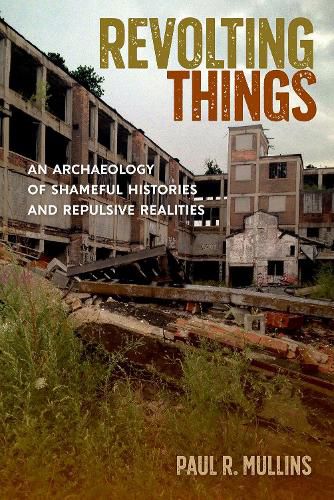Readings Newsletter
Become a Readings Member to make your shopping experience even easier.
Sign in or sign up for free!
You’re not far away from qualifying for FREE standard shipping within Australia
You’ve qualified for FREE standard shipping within Australia
The cart is loading…






This title is printed to order. This book may have been self-published. If so, we cannot guarantee the quality of the content. In the main most books will have gone through the editing process however some may not. We therefore suggest that you be aware of this before ordering this book. If in doubt check either the author or publisher’s details as we are unable to accept any returns unless they are faulty. Please contact us if you have any questions.
In this book, Paul Mullins examines a wide variety of material objects and landscapes that induce anxiety, provoke unpleasantness, or simply revolt us. Bringing archaeological insight to subjects that are not usually associated with the discipline, he looks at the way the material world shapes how we imagine, express, and negotiate difficult historical experiences.Revolting Things delves into well-known examples of dark heritage ranging from Confederate monuments to the sites of racist violence. Mullins discusses the burials and gravesites of figures who committed abhorrent acts, locations that in many cases have been either effaced or dynamically politicized. The book also considers racial displacement in the wake of post-World War II urban renewal, as well as the uneasiness many contemporary Americans feel about the social and material sameness of suburbia.
Mullins shows that these places and things are often repressed in public memory and discourse because they reflect entrenched structural inequalities and injustices we are reluctant to acknowledge. Yet he argues that the richest conversations about the uncomfortable aspects of the past happen because these histories have tangible remains, exerting a persistent hold on our imagination. Mullins not only demonstrates the emotional power of material things but also exposes how these negative feelings reflect deep-seated anxieties about twenty-first-century society.
$9.00 standard shipping within Australia
FREE standard shipping within Australia for orders over $100.00
Express & International shipping calculated at checkout
This title is printed to order. This book may have been self-published. If so, we cannot guarantee the quality of the content. In the main most books will have gone through the editing process however some may not. We therefore suggest that you be aware of this before ordering this book. If in doubt check either the author or publisher’s details as we are unable to accept any returns unless they are faulty. Please contact us if you have any questions.
In this book, Paul Mullins examines a wide variety of material objects and landscapes that induce anxiety, provoke unpleasantness, or simply revolt us. Bringing archaeological insight to subjects that are not usually associated with the discipline, he looks at the way the material world shapes how we imagine, express, and negotiate difficult historical experiences.Revolting Things delves into well-known examples of dark heritage ranging from Confederate monuments to the sites of racist violence. Mullins discusses the burials and gravesites of figures who committed abhorrent acts, locations that in many cases have been either effaced or dynamically politicized. The book also considers racial displacement in the wake of post-World War II urban renewal, as well as the uneasiness many contemporary Americans feel about the social and material sameness of suburbia.
Mullins shows that these places and things are often repressed in public memory and discourse because they reflect entrenched structural inequalities and injustices we are reluctant to acknowledge. Yet he argues that the richest conversations about the uncomfortable aspects of the past happen because these histories have tangible remains, exerting a persistent hold on our imagination. Mullins not only demonstrates the emotional power of material things but also exposes how these negative feelings reflect deep-seated anxieties about twenty-first-century society.